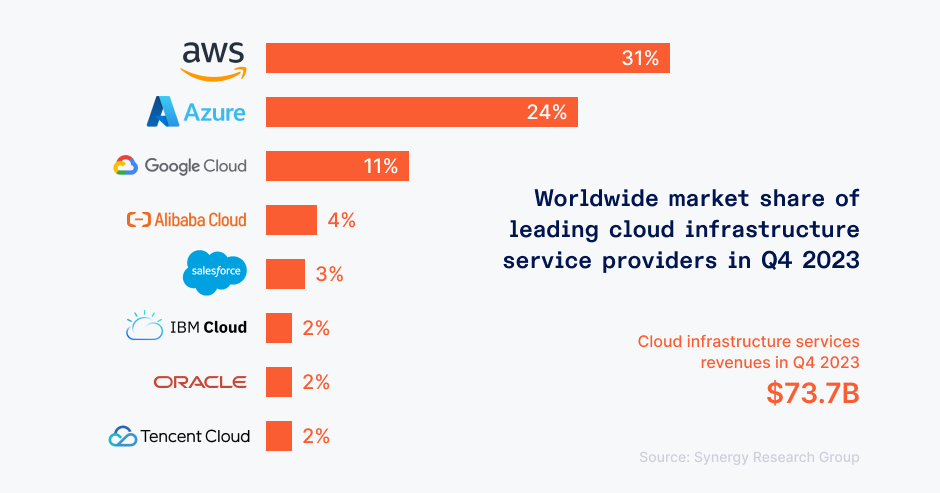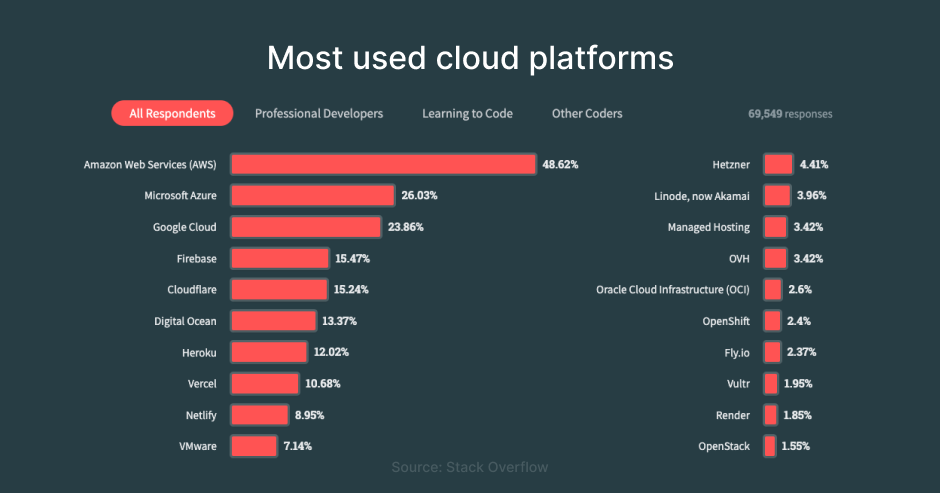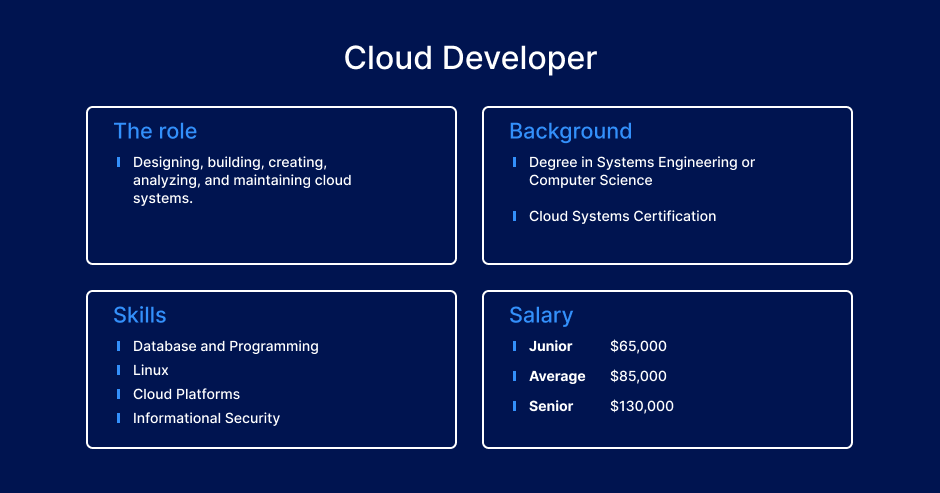Are you setting up an application on AWS or migrating existing ones to the cloud? Maybe you're already running multiple systems on AWS. Now, as you expand your presence on AWS, you need to hire qualified software engineers. You understand that without the right talent, your AWS implementation may not succeed.
According to Statista, Amazon Web Services (AWS) leads the cloud computing market, with a 32 percent share.
To ensure you hire top AWS engineers swiftly, you must build a hiring strategy, evaluate skills accurately, and use effective hiring tools. Here's how to build a strong talent pipeline and hiring plan.
Ready to build a high-performing tech team? At Index.dev, every tech talent undergoes rigorous vetting, ensuring remote performance, English proficiency, full-time availability, tech expertise, communication, team player skills, and more. Let's get started →
What is AWS?
Amazon Web Services (AWS) stands out as the most comprehensive and widely embraced cloud platform globally, offering a plethora of fully-featured services accessible from data centers worldwide.
From burgeoning startups to Fortune 500 companies and government entities, AWS is the preferred choice for organizations aiming to trim costs, enhance agility, and foster rapid innovation.
AWS encompasses a blend of infrastructure as a service (IaaS), platform as a service (PaaS), and software as a service (SaaS) offerings. Its widespread adoption stems from the multitude of benefits it offers:
- Ease of Use: AWS provides user-friendly interfaces and intuitive tools, simplifying complex tasks for users of all levels.
- Flexibility: With AWS, users have the flexibility to customize and tailor services according to their specific needs and requirements.
- Cost-Effectiveness: Leveraging a pay-as-you-go pricing model, AWS enables organizations to optimize costs by paying only for the resources they use, without any upfront investment.
- Scalability: AWS offers scalable solutions that seamlessly accommodate fluctuating demands, ensuring applications can handle increased traffic and workload without compromising performance.
- Reliability: Backed by robust infrastructure and a global network of data centers, AWS delivers high availability and uptime, minimizing downtime and ensuring uninterrupted service delivery.
- Security: Security is a top priority for AWS, with comprehensive security measures, encryption, and compliance certifications in place to safeguard data and applications from unauthorized access and cyber threats.
Also read: Migration to the cloud: 5 essential steps for success
Top 5 AWS Stats and Facts
Here’s a brief overview of some of the most crucial AWS stats.
- AWS Total Users: With over 1 million active users, AWS caters to a diverse range of customers, including large enterprises and small to medium-sized businesses.
- AWS Services: AWS provides 175 fully-functional services, enabling users to deploy application workloads with millisecond latency in just one click.
- AWS Partner Network (APN): More than 90% of Fortune 100 organizations and most Fortune 500 enterprises leverage the APN to develop services and solutions for customers. Major brands like Facebook, Netflix, Adobe, and BBC rely on it for their projects.
- #1 IaaS Player: According to Gartner Inc., AWS dominates the global Infrastructure-as-a-Service (IaaS) market with a 45% share. It outpaces competitors like Microsoft, Alibaba, Google, and Tencent.
- Wide Array of Databases: AWS offers 15 purpose-built databases, delivering superior performance, availability, and scalability for demanding workloads. These optimized database services support various use cases effectively.
Key Skills & Qualifications to Look For in AWS Cloud Engineer
Qualifications
The qualifications of an AWS cloud engineer should include the following:
- Bachelor’s or Master’s degree in Computer Science or Information Technology.
- AWS certification to validate cloud computing skills.
Technical Skills
The technical skills AWS candidates must have are:
- Proficiency in programming languages such as Java, Python, Ruby, PHP, Node.js, etc.
- Strong knowledge of cloud computing principles.
- Understanding of AWS Lambda for serverless computing.
- Networking expertise, including TCP/IP, DNS, VPN, and routing protocols.
- Familiarity with both Windows and Linux environments.
- Solid understanding of AWS security best practices, including IAM, roles, policies, and federated access.
- Experience with AWS services such as EC2 Instances, CodeCommit, S3 buckets, Route 53, ELB, EBS, and VPC.
- Knowledge and experience working with databases like Amazon Aurora, DynamoDB, etc.
- Familiarity with API Gateway for building and managing APIs.
Also read: Python developer hiring guide
Soft Skills
Astute AWS cloud engineers will have the following soft skills:
- Communication Skills: AWS engineers should articulate ideas clearly, negotiate effectively, and facilitate smooth discussions with team members and stakeholders.
- Project Management: Proficiency in project management ensures AWS engineers can plan, organize resources, track progress, and meet deadlines effectively.
- Problem-Solving Skills: AWS engineers encounter challenges regularly, requiring the ability to identify issues, analyze them, and devise effective solutions. This involves attention to detail, effective research, and creative thinking.
- Leadership Skills: Experienced AWS engineers may transition to leadership roles, requiring skills to guide and motivate teams.
- Adaptability: Adaptability enables engineers to stay updated on emerging technologies, embrace change, step out of comfort zones, and tackle new challenges confidently.
Also read: Hiring high-performing developers vs average developers: What sets the top 1% apart
How to Develop an Effective AWS Hiring Strategy
Due to its substantial market share, there's a significant demand for hiring AWS engineers across all skill levels, from entry-level to expert positions. However, filling these roles presents several challenges:
- Shortage of Talent: There's an acute scarcity of qualified AWS engineers which leaves many positions unfilled.
- Retention Measures: Companies guard their skilled talent assets and implement strategies to retain them, further limiting the available pool of qualified candidates.
- Skills Gap: The slow adoption of AWS skills by IT professionals further contributes to the shortage of qualified engineers, widening the talent gap.
- Competition for Talent: Employers face stiff competition in attracting qualified AWS engineers, as enticing offers from other companies make it difficult to secure top talent.
- Candidate-Driven Market: AWS engineers hold the upper hand in a candidate-driven market, as they have the advantage of selecting from numerous job opportunities.
To overcome these challenges and successfully hire high-quality AWS engineers, consider implementing the following steps as part of your hiring strategy:
1. Define Project Needs
Clearly outline the company's requirements and accurately define the job scope, including role specifications, required skills, qualifications, and experience. Understanding the project's needs enables targeted candidate selection, saving time and resources. Here are some examples of AWS job roles:
- AWS Developer Engineer: Creates and maintains AWS cloud infrastructure for application deployment.
- AWS Solutions Architect: Manages the organization's cloud computing architecture.
- AWS SysOps Administrator: Provides expertise in cloud computing, IT, and business applications.
- AWS Cloud Architect: Designs and plans the implementation of cloud assets.
- AWS Cloud Engineer: Builds and maintains AWS cloud infrastructure for applications.
- AWS DevOps Engineer: Automates testing and deployment of AWS infrastructure and applications.
- AWS Security Engineer: Assesses risks and implements countermeasures to protect data.
- AWS Migration Engineer: Facilitates migration of workloads between on-premises and cloud environments.
- AWS Data Engineer: Designs and implements large-scale enterprise data solutions using AWS services.
- AWS Data Scientist: Analyzes data outcomes to generate actionable insights for businesses.
Once you have established the job scope, develop a comprehensive job description outlining the role, required skills, and experience. Include details about the project, company values, and job responsibilities to attract suitable candidates. A concise yet informative job description ensures that only interested and qualified individuals apply.
2. Source Strategically
To find the best AWS engineers for your tech team, explore diverse sourcing methods tailored to reach skilled candidates:
- Utilize Online Platforms: Explore platforms like LinkedIn, GitHub, and AWS forums to connect with potential candidates possessing relevant skills.
- Attend Tech Events: Participate in tech events, hackathons, and conferences worldwide to network with talented professionals and identify potential hires.
- Collaborate with Specialized Firms: Consider partnering with reputable AWS consulting or staffing firms to streamline the hiring process and find the right fit for your needs.
- Leverage Index.dev: Harness Index.dev's extensive sourcing techniques, which tap into diverse engineering communities, global job boards, and specialized forums. Index.dev's handpicked matching process ensures the newly-assigned tech talent is the right fit for your company culture and project requirements and has the necessary technical prowess, communication abilities and problem-solving acumen to thrive.
Also read: Maximizing developer sourcing with these 4 hacks
3. Assess Technical Proficiency
Evaluating technical skills is paramount when hiring remote AWS engineers. Consider the significance of AWS certifications like AWS Certified Solutions Architect or AWS Certified DevOps Engineer, which validate expertise in AWS services.
Implement thorough technical interviews and assessments covering AWS services, infrastructure management, security, and scalability. Assess candidates' abilities through practical tasks or questions tailored to their role as AWS engineers.
Also read: Best Practices for Evaluating Developer Skills: Mastering Technical Assessments
4. Ask Pertinent Questions During Interviews
During AWS engineer interviews, pose relevant technical queries to gauge candidates' knowledge and problem-solving abilities. Here are some sample questions to guide your assessment:
Technical Questions
- How do you monitor application system performance using AWS services?
- What strategies do you employ to mitigate DDOS attacks with AWS?
- Explain the concept of Lifecycle Hooks in AWS.
- Describe your approach to utilizing caching for performance optimization.
- How do you design architectures to handle failures effectively?
- Discuss your method for creating a self-healing architecture in AWS.
- How do you manage large-scale events within AWS infrastructure?
- Elaborate on different types of AWS virtualizations.
- How would you distribute workload between public and private servers?
- Define the purpose and function of a Security Group in AWS.
- What are the best security practices for Amazon EC2 instances?
- Explain the significance of Amazon S3 in cloud storage.
- When and why would you use SnowBall in AWS?
- Describe the role and benefits of Amazon Virtual Private Cloud (VPC).
- Discuss the advantages of Amazon IAM for access management.
Experience-Related Questions
- Share your previous experiences implementing AWS solutions.
- Describe significant challenges you encountered in past AWS projects and how you resolved them.
- Can you discuss common cloud storage issues you've faced and your solutions?
- How do you advise companies on their cloud storage requirements?
- Explain how you communicate technical requirements and project reports to non-technical stakeholders.
5. Determine the Competitive Salary Range
In the current cloud engineering market, where demand outweighs supply, AWS engineers anticipate higher compensation when considering new opportunities. Establishing an attractive salary range is essential to attract top talent.
Consider Market Trends: According to Talent.com, the median annual salary for an AWS cloud engineer in the US is $140,000. Entry-level positions typically start at $119,984 per year, while seasoned professionals can earn up to $171,667 annually.
High Demand for Cloud Skills: LinkedIn reports cloud as one of the most sought-after hard skills for six consecutive years. Indeed's recent study also ranks cloud as the number one in-demand skill. This high demand translates to abundant job opportunities and lucrative pay for cloud professionals.
How Index.dev Can Help
Choosing Index.dev for your hiring needs offers distinct advantages that differentiate it from other solutions.
- Access to Global Talent Pool: Index.dev grants access to a carefully curated network of seasoned AWS engineers from across the world. This ensures you find candidates with the precise skills and experience needed for your project.
- Simplified Hiring Processes: Index.dev simplifies the hiring and management of remote teams, saving valuable time and resources. With services ranging from talent matching to payment management and compliance assistance, the platform streamlines every aspect of building and managing remote teams.
- Comprehensive Support: Index.dev provides comprehensive support throughout the entire process of building and managing remote teams. From sourcing and vetting candidates to handling payroll and ensuring compliance, Index.dev is committed to helping businesses build and maintain successful remote AWS engineering teams.
Also read: 18 indispensable productivity tools for remote & distributed development teams
Next Steps with Index.dev
Securing the right AWS cloud engineer swiftly is paramount, and Index.dev expedites the process through a meticulous 4-step vetting process:
- Extensive Sourcing: We tap into over 500 channels to locate candidates, evaluating each one individually to identify high-performing tech talent.
- Thorough Tech Assessment: Beyond traditional resumes, we conduct rigorous interviews and technical evaluations to gauge candidates' abilities, prioritizing those with essential tech skills and industry know-how.
- Meticulous Soft Skill Verification: Candidates are screened for vital soft skills like problem-solving, communication, creativity, and time management.
- Laser-Focused Matching: Using both technology and expert recruiters, we handpick talent precisely tailored to your company's needs, ensuring a seamless fit.
Also read: Vetting High-Performing Tech Talent: Our Rigorous 4-Step Process
With Index.dev, you can onboard your AWS cloud developer up to 7 times faster, receiving three interview-ready candidates within just 48 hours. Onboarding takes less than a week after your selection.
During the 30-day trial period, you can assess the fit risk-free, with an impressive 97% trial-to-hire rate guaranteeing the perfect match every time. Additionally, our dedicated account management team provides continuous support and assistance for long-term success.
Looking to expand your tech team? With over 300 successfully placed remote developers globally, a 3x retention rate and an average of 13 months job engagement, Index.dev is your go-to partner. Get matched with vetted remote engineering talent in under 48 hours, ready to start at rates from $1600 per week. Sign up or talk to a tech consultant now →
Seeking long-term, high-paying remote jobs? Sign up now and connect with premier US cloud computing enterprises, startups, and projects →


